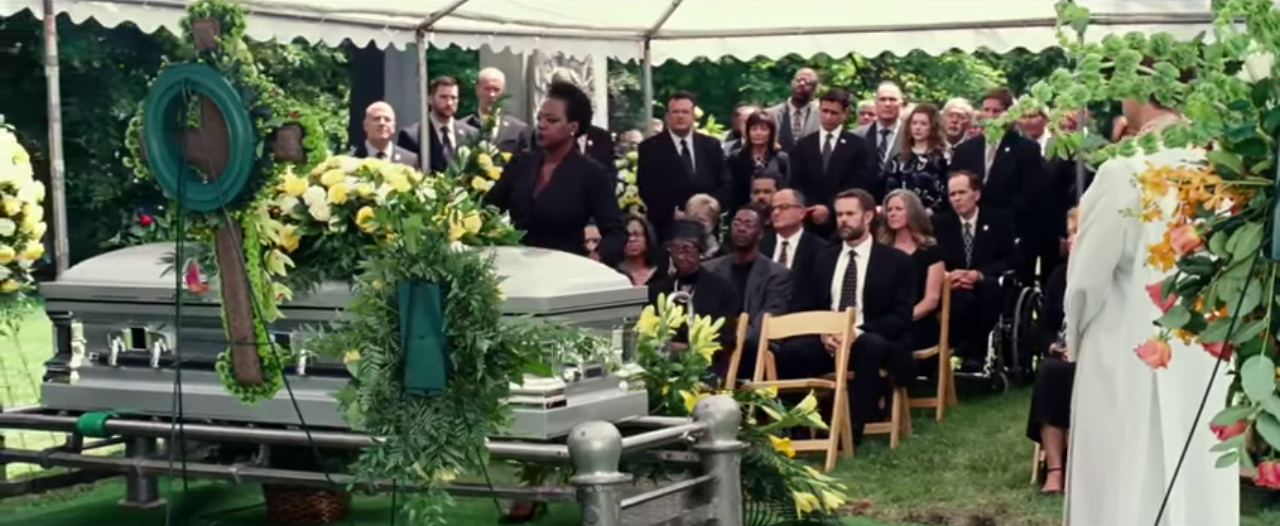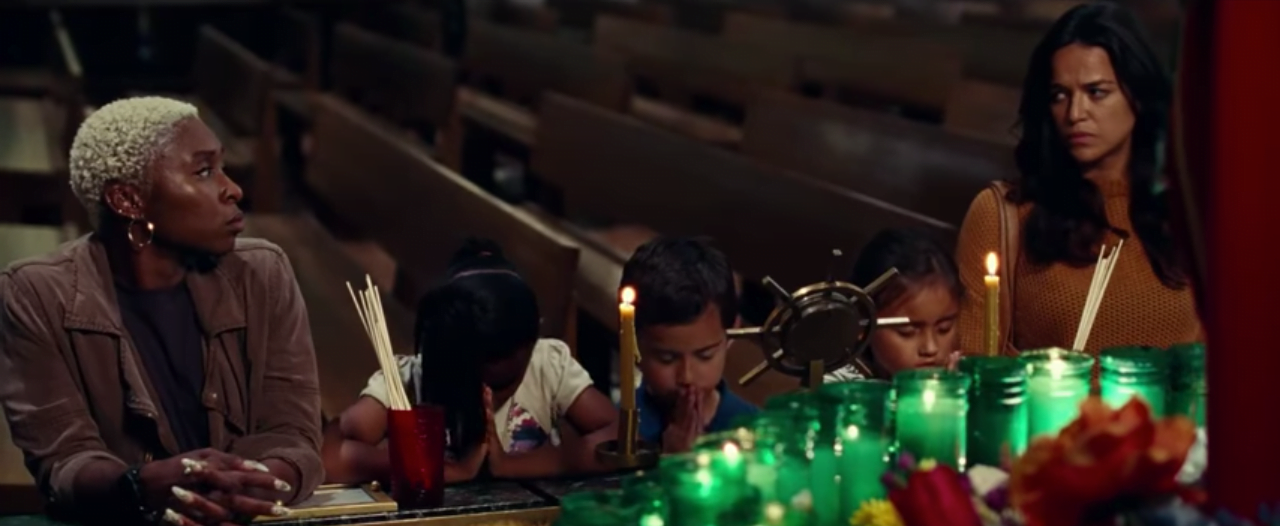Heists are more fun to watch if the heisters are plotting because they want to, not because they have to… apparently.
Earlier this year, we watched glamorous crooks — played by Sandra Bullock, Cate Blanchett, Rihanna, Helena Bonham Carter, and more — conspire to pull off a seemingly impossible robbery. The movie didn’t take itself seriously, so neither did the audience. But as a genre exercise, it was an unremarkable two hours of fun. Our enjoyment was enhanced by the opportunity to see girls having fun in a game usually played by boys. Ocean’s 8 was as impressive as an extravagantly decorated ice cream cake — and just about as nutritious. In other words, one slice was plenty. No need to go back for more.
And thus, if you’re like me, you probably got excited by the trailer for Widows.

Here’s another movie about women conspiring to commit a robbery, women who have such compelling reasons that anybody with a heart will hope that they succeed. It would come from the director of the heavy Oscar-winner 12 Years a Slave. It would star award-caliber actors — a lot of them — including Viola Davis, Robert Duvall, Colin Farrell, Daniel Kaluuya. It would feature Liam Neeson as someone whose daughter hasn’t been taken. It promised to pull back the curtain on corrupt Chicago politics, and deliver cathartic retaliatory blows to abusive husbands.
It looked like a full meal deal.
But, alas, while Widows is certainly a more ambitious film than Ocean’s 8, it left me feeling like I’d done two hours of film-critic homework when I thought I’d bought a ticket to see pros play a great game. It wasn’t cake; it was a difficult, overcooked steak. It wasn’t much fun at all.

Director Steve McQueen and his cowriter Gillian Flynn (author of Gone Girl, the book and the movie) are unlikely but talented collaborators. But it’s easy to sense how they struggled to boil their source material — a British TV series — down into a concentrate. They can’t decide what they want to deliver: Is this movie about knuckle-biting suspense, shout-out-loud twists, and the cathartic retaliation of mistreated women against monstrous men? Is it a commentary on how women are trapped in a world where even their struggle for freedom and dignity must be fought with methods made by men? Is it a grim social studies lesson, meant to furrow our brows over corrupt political campaigns, toxic masculinity, and urban poverty?
I suspect it’s possible for a production to succeed at all of these things… as a miniseries. (Maybe the source material worked — I haven’t seen it.) This thing doesn’t have the luxury of time; it can’t develop the characters or complexity it needs. As political commentary, Widows’ barely leaves a scratch on Chicago’s rough surface. And as thrillers go, its surprises… well, they aren’t, really.
Not all of the news here is bad. McQueen, who knows the value of first-class acting, gets strong performances from almost everyone involved. And he can cook up memorable moments. My favorite in this film is the first one: a close-up of Veronica (Viola Davis) and her husband Harry (Liam Neeson) kissing. For a reason I won’t spoil here, it’s a kiss that leaves us unsettled.
Then, in a heartbeat, McQueen cuts immediately to a high-speed, high-stakes car chase through Chicago, during which the trouble with Harry becomes clear: he’s part of a heist crew, and this is a robbery gone wrong. Before long, he and his team have been erased in a fiery cataclysm. The money they’ve lifted is gone.

And the villains — corrupt politicians with an army of crooks to do their dirty deeds behind the scenes — aim their attention, anger, and intimidation tactics at the rattled wives and girlfriends, demanding that the money (which turns out to be corrupt campaign funding) be recovered.
More good news: Veronica’s team is just as compellingly watchable as the fashion-ready cast of Ocean’s Eight, as severe and scowl-prone as as the Ocean’s gang was sexy and smug. Davis applies the same emotional intensity she brought to Denzel Washington’s arthouse adaptation of Fences. And she’s given formidable support by Linda (Michelle Rodriguez), a righteously angry single mother in danger of losing her business; Alice (Elizabeth Debicki), whose wicked-witch mother (Jackie Weaver) wants her to become a high-end escort to rich movers and shakers (like the one played with a Big Bad Wolf grin by Lukas Haas — and, wow, I remember him in Witness, so I am officially Very Very Old); and Belle (Cynthia Erivo), who turns out to be much more than a reliable nanny.
Perhaps the most refreshingly unconventional aspect of this movie is the way in which these women take little to no pleasure in their mission and partnership. They are doing this because they have to. Their lives are at stake. And they barely have time to comprehend their mutual awakening: The men they loved and lost were far, far more wicked than they’d suspected. And in order to save themselves from men who are even more monstrous, they’ll have to play the same dirty game like professionals.

Perhaps the most boringly and poorly staged aspect is the film’s subplots about the candidates fighting for election as a Chicago alderman: Jamal Manning (Brian Tyree Henry), a crime lord trying to put the local megachurch pastor in his pocket, and Jack Mulligan (Colin Farrell), the prince of a royal Chicago family and disgruntled son of an Angry Old Man (Robert Duvall). We’re living in times in which politicians commit shocking evils right out in the open, but it’s still hard to believe Manning threatening housepets to get what he wants, and harder still to bear Mulligan Senior’s shouting matches with his son.
The film has that signature McQueen look, thanks to his go-to cinematographer. Sean Bobbitt loves to capture the surface tension of stress on the human body, and here he revels in the dilapidated textures of those off-the-map garages where crooks cook up heists. He also makes more of slick car windshield reflections than anyone has since Steven Soderbergh’s Out of Sight,

But that’s part of the problem: McQueen makes meditative pictures. He’s earned his place among A-list directors for artful, solemn portraits of men oppressed by society, imprisoned by the law, or dragged down by their own worst impulses. He hasn’t given us any evidence that he has much tonal range. And, sure enough, this movie is so saturated with angst that it feels downright awkward when things shift into action mode. A little levity would have helped. It’s too busy feigning relevance.
(Come to think of it, the only director I know who can sustain my suspension of disbelief while combining such heavy solemnity, cultural commentary, and edge-of-your-seat action is, ironically, Michael Mann, whose primary and ongoing weakness has been his disinterest in female characters and actresses.)
Another problem: Three of the actors I was eager to see in Widows are poorly employed here.

I’ve already mentioned that Duvall’s sparring matches with Farrell are cringe-worthy, but he’s barely onscreen enough to qualify as a Supporting Actor.
Daniel Kaluuya, on the other hand, is in it too much. I heard some popular podcast personalities gushing about how his eyes are the scariest thing in the movie. He does make an impression as the villains’ blunt instrument, but I felt like his heavy-lidded killer glare became a sort of shtick that got older every time he shoved his face into someone else’s. Kaluuya’s eyes are his most arresting aspect, but if he does this one more time, it’s going to be too easy to parody his performances.

Finally — Elizabeth Debicki. I’ve loved her since Baz Luhrmann’s The Great Gatsby, but I really want to see her shine in a role that isn’t so… Deb-icky. Seriously — 1980s Crime Thrillers called and want their gratuitous nudity back.
I note with some concern that, out of all of the film’s fine performances, it’s Debicki who is earning serious awards buzz: Isn’t that joke old by now — the one about the surest way to earn an Oscar being a role as a “hooker with a heart of gold”? Is this going to be another case of an award going to the one who was willing to go “all the way”? (Think about how that worked out for Halle Berry.)
The film’s biggest problem, though, isn’t its cast or its ambitions. It’s the writers’ failure to reckon with the ‘Ends Justify the Means’ messiness of this affair. You can’t have it both ways: you can’t make us nod solemnly as corrupt politicians effectively describe America’s moral vacuousness and then ask us to cheer as those who have been done wrong smash their way to payback. Ultimately, the film writes itself to a dead end, with a face-off that falls flat and an epilogue that embarrasses itself trying to squeeze a happy ending from a community fractured beyond repair.
So, alas, I can’t join the chorus of praise for this one, except to say that the opening shot is almost worth the price of admission. It startled me and made me brace for two hours of unexpected jolts and delights. Which never came.